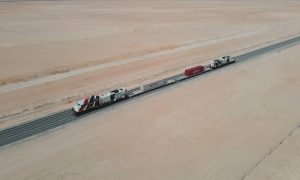Etihad Rail begins construction of $4.9bn, 605km long second phase of rail network
Phase Two of the network will link Al Guwaifat on Saudi border, to Fujairah and Khorfakkan on the east coast of the UAE

Etihad Rail, the developer and operator of the UAE’s integrated railway network, has begun construction of the second phase of the rail network – linking Al Guwaifat on the Saudi border, to Fujairah and Khorfakkan, on the UAE’s eastern coast, running 605km long.
Mohammed Rashid Al Marzouqi, the executive director of Relations at Etihad Rail, said that contracts worth $4.9 billion have been awarded in this phase, according to a report by WAM.
Al Marzouqi added that Etihad Rail was manufacturing a new fleet of locomotives, increasing its fleet size to 45, as well as establishing a major operations and maintenance centre in Al Fayah in Abu Dhabi emirate, confirming that the company is moving quickly towards completing one of the largest and most important projects in the country.
During the interview with WAM, he also pointed out that Etihad Rail’s key project will affect many sectors, including the economy, society, the environment and tourism, and that it will help establish a new transport sector in the UAE, and achieve a milestone in the shopping and logistical services sector.
In January 2020, Etihad Rail began the second phase of the national railway project, which runs 605km long, with Stage A extending 139km to link Ruwais with Al Ghuwaifat at the Saudi border, Stage B extending 216 km from Tarif to Seeh Shuaib, Stage C running 94 km from Jebel Ali to Sharjah and Stage D being 145 km from Sharjah to the ports of Fujairah and Khorfakkan.
The project will see the construction of further stages to complete the network, he added.
Furthermore, Al Marzouqi added that Etihad Rail has constructed its centre in Al Fayah, which is managed by a coalition led by the French company, Vinci Construction. This project is part of its future goal to create a railway network that supports the long-term growth of the nation’s economy.
The company is also building stations in Al Ruwais, ICAD, Khalifa Port, Dubai Industrial City, Jebel Ali Port, Al Ghail, Siji, and the ports of Fujairah and Khor Fakkan, to handle the loading and unloading of trains, as well as for container storage and maintenance, he added.
Al Marzouqi said the stations will provide customers with numerous advantages, such as enabling them to board available trains.
These stations will become major hubs for distribution of local and regional logistics services, which include customs warehouses and the inspection of goods on site.
They will also serve many other sectors, most notably the construction material sector, and they will help transport over 30 million tonnes of rocks per year through the rail network.
As part of the company’s efforts to complete the project, it has increased its fleet to 45 locomotives supplied by “Progress Rail: A Caterpillar Company.”, he explained.
Each locomotive features a 4,500-horsepower engine, which is one of the most powerful in the region and will help upgrade the company’s fleet of advanced locomotives and raise the transportation capacity of the rail network to over 60 million tonnes annually.
Progress Rail is one of the world’s leading manufacturers of diesel and electric locomotives, and it designed and manufactured 38 heavy transport locomotives that can withstand the geographic nature, climatic conditions, high temperatures and humidity of the Arab Gulf region.
The company’s fleet of locomotives will be equipped with the latest filtration systems, such as the pulsed filtration system and sand filtering system, ensuring that trains operate reliably when travelling through desert areas.
The engines of the new locomotives also feature the latest technologies to reduce emissions, producing 70 to 80 percent less carbon emissions than trucks carrying the same weight of goods. The locomotives can transport 100 vehicles per train and equal the volume of goods transported by 5,600 daily trips by trucks, Al Marzouqi told Wam.
Since the start of 2020, Etihad Rail has ensured the country’s Emiratisation by organising training and national talent employment programmes to help Emiratis join the labour market and contribute to the national economy, he explained.
By the start of the implementation of phase two of the project, the company, with the help of its partners, will have created 50 training and employment opportunities for Emirati citizens, he added.





